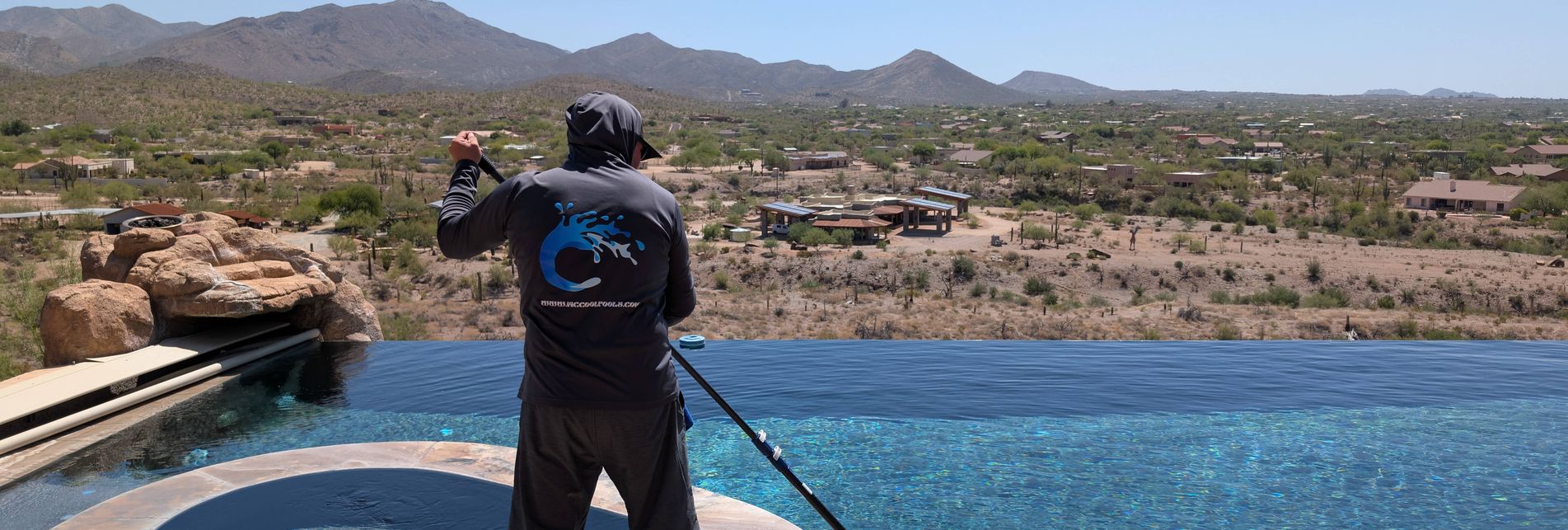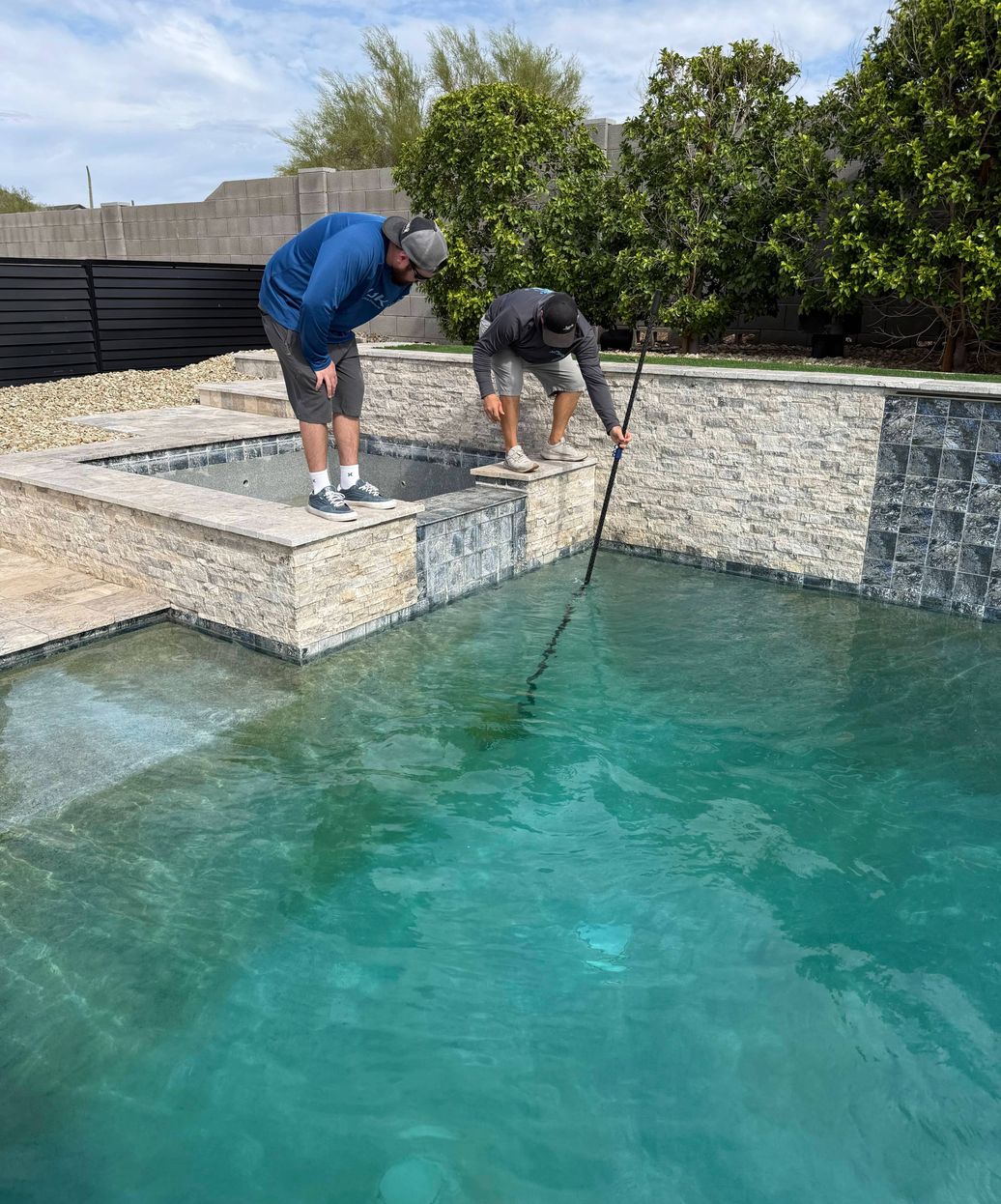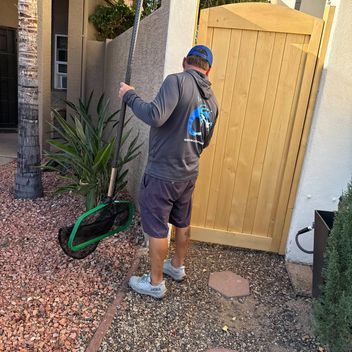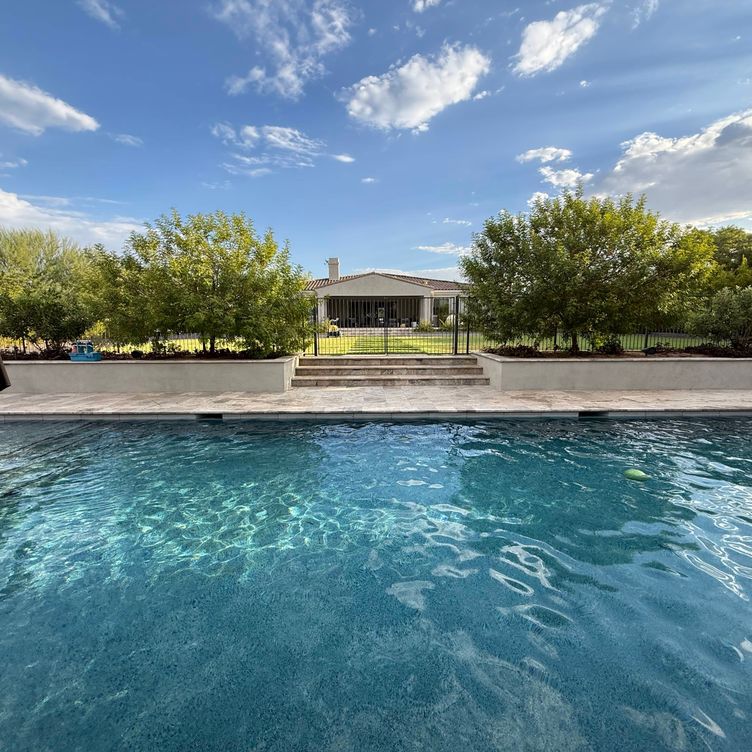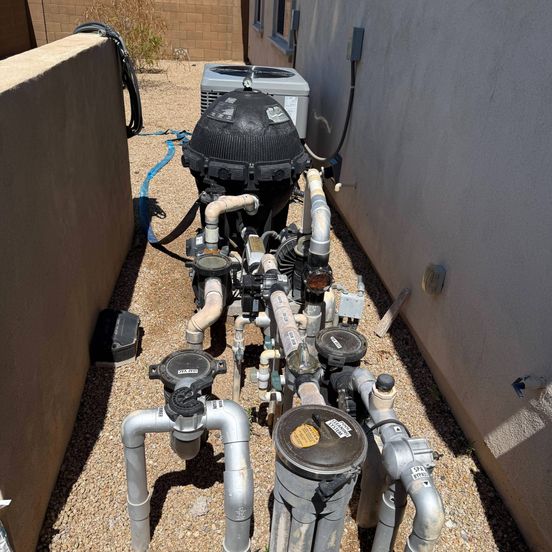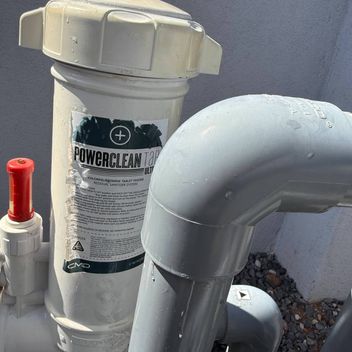Pool Service & Maintenance Questions Answered
Expert Answers from Nearly Two Decades of Pool Care Experience
At McCool's Pools, we've been answering pool owners' questions since 2005. Whether you're considering professional service, troubleshooting an equipment issue, or simply want to understand pool maintenance better, we're here to help. Below you'll find answers to the most common questions we receive. If you don't see your question answered here, don't hesitate to contact us—we're always happy to share our expertise.
Service & Pricing Questions
What does your weekly maintenance service include?
Our comprehensive weekly service includes chemical testing and balancing, brushing pool surfaces, skimming debris, emptying all baskets (skimmer, pump, and leaf canisters), equipment performance checks, vacuuming as needed, salt cell maintenance when applicable, and backwashing when required. We also monitor equipment performance, adjust timers seasonally, and record service details that we email to you after each visit. This thorough approach keeps your pool clean, safe, and operating efficiently year-round.
How much does pool service cost in the Phoenix area?
Quality professional pool service in Phoenix typically ranges from $115-140 per month. This covers chemicals (approximately $55/month), insurance, fuel, overhead, skilled labor, and reasonable profit margin. Services priced significantly below this range—especially under $75/month—often cut corners on chemicals, employ inexperienced technicians, carry inadequate insurance, or provide inconsistent service. Remember that proper pool maintenance protects equipment worth thousands of dollars, so choosing service based solely on the lowest price often proves expensive in the long run.
Are there any extra charges beyond the monthly service fee?
Our weekly service covers all routine maintenance. Additional charges apply to filter cleanings (recommended 3 times per year at $155 each), replacement parts like pump baskets or O-rings, and repairs. We always communicate any recommended services or necessary repairs before performing work, so you're never surprised by unexpected charges. Many minor items like basket replacements or O-ring changes are inexpensive and prevent bigger problems.
Do you offer one-time cleanings or only ongoing service?
While our business model focuses on ongoing weekly maintenance relationships, we do provide one-time services for specific situations—such as green pool recovery, pre-sale cleanings, or special event preparations. However, we've found that consistent weekly service delivers the best results and value for pool owners. One-time cleanings can address immediate problems but don't provide the ongoing monitoring that prevents issues and protects your investment.
How long are you committed to if you sign up for service?
We don't require long-term contracts. Our goal is to earn your business every week through excellent service, not lock you in with complicated agreements. If you're ever unsatisfied with our service, we want to know so we can make it right—not trap you in a contract. Most customers stay with us for many years because they appreciate our quality, consistency, and reliability, not because they're obligated to.
Equipment & Repair Questions
How do I know when my pool equipment needs repair versus replacement?
This depends on the equipment's age, condition, and repair cost relative to replacement cost. As a general rule, if repair costs exceed 50% of replacement cost for equipment that's more than 10 years old, replacement usually makes better financial sense. However, every situation is unique. We always provide honest assessments and explain your options clearly, helping you make informed decisions. Sometimes a $200 repair can extend equipment life for years; other times, investing in replacement makes more sense than repeatedly repairing failing equipment.
What brands of pool equipment do you service and install?
We service and install all major pool equipment brands including Pentair, Hayward, Jandy, Fluidra/Zodiac, Raypak, and others. Our technicians receive ongoing training on the latest equipment and stay current with technology changes. Whether you have a 20-year-old pump or the newest automation system, we have the knowledge and experience to service it properly. We also have access to parts for older equipment that's no longer manufactured.
Can I buy equipment online and have you install it?
While we can sometimes install customer-supplied equipment, we generally don't recommend this approach. Equipment purchased online often lacks manufacturer warranty support—if problems develop, the manufacturer may refuse warranty service on products not purchased through authorized dealers. Additionally, internet prices often aren't as competitive as they appear once shipping, sales tax, and potential return costs are included. We work hard to provide competitive pricing on quality equipment with full warranty backing.
How long do typical pool repairs take?
Most common repairs can be completed in a single service visit lasting 1-3 hours. Pump motor replacements, heater repairs, and automation troubleshooting usually take 2-3 hours. Some complex repairs or those requiring special-order parts may need a second visit. We always work efficiently to minimize disruption while ensuring repairs are done correctly. Emergency repairs that prevent pool use receive priority scheduling.
Do you provide warranties on repair work?
Yes, we warranty our labor and stand behind all work we perform. Equipment warranties vary by manufacturer—most new equipment carries 1-3 year manufacturer warranties that we help coordinate if problems arise. We're committed to making things right if any issues develop with our work. This commitment to backing our service has earned us loyal customers throughout nearly two decades in business.
Water Chemistry Questions
Why does my pool water turn green even with weekly service?
Green water indicates algae growth, which can happen for several reasons even with regular service. Common causes include equipment failures (like a pump that stopped working between visits), unusual weather events (like dust storms that dump organic material into pools), extended power outages, or damage to pool surfaces that creates algae-harboring rough spots. When this happens, we provide green-to-clear treatment that eliminates algae and restores water clarity. Prevention is always better than cure, which is why consistent service and proper chemical levels are so important.
Should I drain my pool periodically?
Pools in the Phoenix area typically need draining every 3-5 years due to our hard water and high total dissolved solids (TDS) that accumulate over time. Signs you need draining include difficulty maintaining proper chemistry, high calcium hardness that causes constant scaling, or water that always looks slightly cloudy despite proper filtration and chemistry. We provide professional drain services that protect your pool finish and refill properly. Never drain your pool without professional guidance—improper draining can cause serious structural damage.
Why is calcium hardness so high in Phoenix pools?
Phoenix municipal water already contains high calcium levels before it enters your pool. Then, as water evaporates in our hot, dry climate—which happens constantly—the calcium concentrations increase further. This is why calcium scaling on tile and equipment is such a common problem in our area. Proper water chemistry management and regular professional tile cleaning help control calcium-related issues, but they can't be eliminated entirely. Salt systems can accelerate calcium scaling if not monitored carefully.
What causes chlorine demand to increase?
Many factors increase chlorine demand: hot weather and high temperatures, heavy bather loads, organic debris like leaves and pollen, dust storms, rainfall that introduces contaminants, and algae growth. During Arizona summers, chlorine consumption can double or even triple compared to winter months. This is why professional service that adjusts chemical dosing based on seasonal conditions and pool usage is so valuable—we ensure adequate sanitation regardless of changing conditions.
Is saltwater better than traditional chlorine?
Saltwater chlorine generators offer several advantages: softer-feeling water, automated chlorine production, reduced chemical handling, and lower long-term operating costs. However, they require an upfront investment, need regular cell maintenance, and can accelerate calcium scaling in our hard water. Many pool owners love their salt systems, but they're not universally better—they're just different. We help you understand the pros and cons so you can make an informed decision based on your priorities and budget.
Seasonal & Maintenance Questions
Do I need pool service during winter months?
Yes! While pool usage decreases in winter, maintenance requirements don't disappear. Algae can grow in cold water if chlorine levels drop. Equipment still needs monitoring to catch problems early. Chemical balance still requires attention. Debris still accumulates. Skipping service during winter often leads to green water when temperatures rise and expensive repairs from undetected equipment problems. Year-round service protects your investment and ensures your pool is always ready when you want to use it.
How often should filters be cleaned?
We recommend filter cleaning three times per year for most pools—roughly every four months. This frequency maintains optimal filtration efficiency without excessive wear on filter media. Filters that go too long between cleanings lose effectiveness and make pumps work harder, wasting energy. Overly frequent cleaning can damage filter elements and isn't necessary for most pools. We monitor filter pressure and recommend cleaning based on actual conditions, not just arbitrary schedules.
What maintenance can I do myself to reduce service needs?
Honestly, not much if you have weekly professional service. The biggest thing you can do is keep large debris out of your pool—remove leaves, twigs, and other objects before they sink. Empty your skimmer basket occasionally between visits if you notice heavy debris accumulation. Beyond that, professional service handles everything more efficiently than homeowners can. Attempting DIY maintenance often creates problems—like improper chemical dosing or equipment damage—that cost more to fix than the service would have cost.
Should I run my pump 24/7 or use a timer?
Most pools should run their pumps 8-12 hours per day, divided into sessions that provide adequate circulation and filtration while minimizing energy costs. The specific runtime depends on your pump size, pool volume, and seasonal conditions—we need longer runtimes in hot summer months. Modern variable-speed pumps can run 24/7 at low speeds very economically. We set timers appropriately during service visits and adjust them seasonally to maintain water quality while minimizing operating costs.
How long does pool equipment typically last?
Equipment lifespan varies by type, quality, and maintenance. Pumps typically last 8-12 years. Filters last 10-15 years with proper care. Heaters last 7-12 years depending on usage. Automation systems last 10-15 years. Salt cells need replacement every 3-7 years depending on usage and water chemistry. These are averages—proper maintenance extends equipment life while neglect shortens it significantly. Regular service that monitors equipment condition and catches problems early maximizes your equipment's lifespan and return on investment.
Still Have Questions?
We understand that pool ownership raises many questions, especially for new pool owners or those considering professional service. Our team at McCool's Pools is always happy to provide expert advice and honest answers. Whether you're troubleshooting a problem, considering equipment upgrades, or simply want to understand your pool better, we're here to help. Contact us today—we're passionate about pools and love sharing our knowledge with pool owners throughout the Phoenix area.
Contact Us Today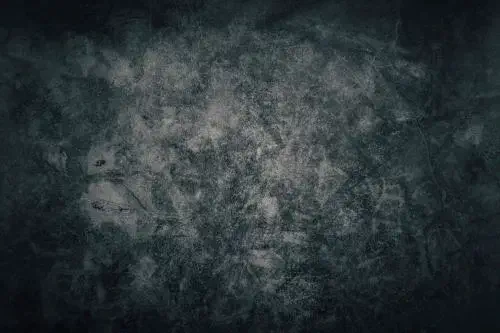
Common Pool Care Questions
We service Phoenix, Scottsdale, Paradise Valley, Cave Creek, Carefree, North Peoria, Fountain Hills, Rio Verde, Anthem, Desert Hills, New River, and Desert Mountain.
Yes, we are fully licensed, bonded, and insured. Our technicians are certified in pool maintenance and water chemistry with nearly two decades of experience.
We prioritize equipment failures that affect pool usability. Most emergency repairs can be scheduled within 24-48 hours, often sooner during peak season.
Yes! We provide free, no-obligation estimates for all services including weekly maintenance, equipment repairs, installations, and special services.
Absolutely! Our green-to-clear service eliminates algae and restores water clarity, typically within 5-7 days. We then provide ongoing service to prevent recurrence.
